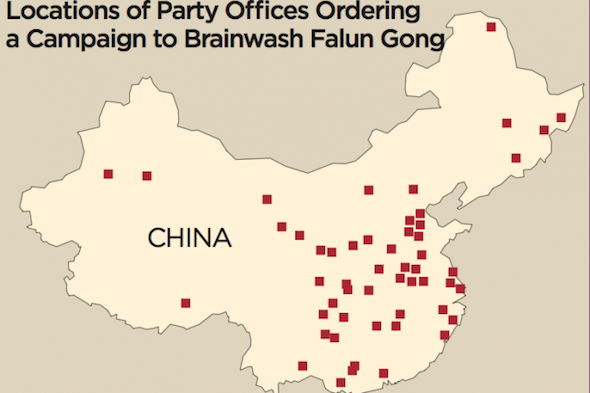Documenting a Campaign of ‘Transformation’ Ordered in China
Epoch Times
Spreadsheet and map indicate a nationwide effort to brainwash Falun Gong practitioners
By Matthew Robertson, Epoch Times

Over the last several months, the Chinese authorities have begun a campaign that seeks to forcibly change the beliefs of millions of Falun Gong practitioners.
Epoch Times has documented this new campaign by collecting a sampling of 56 of the thousands of notices about the campaign published on official websites around China, and tabulated the date and location of its provenance, its title, URL (and corresponding archive), and a representative excerpt.
A spreadsheet of the circulars is here, and an interactive map, drawn from that data, showing their locations, is here.
In the Chinese communist literature, the process of changing someone’s beliefs by force is known as “transformation” (zhuanhua). It is supposed to conclude with the adherent signing three statements: a statement of repentance, disavowing their belief in Falun Gong; a statement reporting on others who practice Falun Gong; and statement accepting the beliefs of the Chinese Communist Party.
The campaign against Falun Gong began in 1999, but 14 years later has still not managed to succeed. Jiang Zemin, the Party chief at the time responsible for the campaign, had aimed to eliminate the practice within three months. Jiang targeted the campaign out of fear of how popular it had become–in 1999 more people in China were practicing Falun Gong than were members of the Communist Party.
This new campaign is being termed the “final battle” (juezhan) in the circulars that are posted on local Party and government websites across the country. Its finality may be in question, though, given that it is the second three-year campaign (the first ran from 2010-2012) to follow a similar format: quotas for the targeting of known Falun Gong practitioners across the country.
There are no indications that the current campaign will be any more successful than the last.
In some cases, the quotas demanded by Party authorities shy away from an expectation that the transformation will actually be effected. In these instances, Party officials simply demand that “stubborn elements” (meaning Falun Gong practitioners who refuse to renounce their faith) be admitted to education classes once a year — it is not stipulated that they must be successfully re-educated.
The many thousands of notices about the campaign published on official websites around China, which follow a similar format to one another, indicate that the campaign is national, and that the orders to carry it out came from the top of the Party apparatus.
The Muleng City Government in Heilongjiang Province, in the cold northern extreme of China, for example, had this to say: “In our struggle against the ‘Falun Gong’ heterodox religious group, we strictly separate the majority of practitioners who have been hoodwinked, from the very small number of anti-Party, anti-socialist, backbone elements with political ambitions. In this way, we best unite the majority of the practitioners, turning passivity into proactiveness, to attack in an isolated manner the very small number of evil religious backbone elements.”
Also among the targets were a number of educational institutions. At the Yingdong District Bureau of Education, Fuyang city, Anhui province, for example, a circular said: “Strictly prohibit teachers and students from all schools to participate in Falun Gong activities… to prevent events with extremely negative incidents.”
“Participate” in this case refers to the practice of Falun Gong, which includes five meditative exercises, and an adherence to the principles espoused by the practice, truthfulness, compassion, and tolerance.
In an interview with Epoch Times for an article about the new movement, Liang Xiaojun, a rights lawyer in China, remarked: “There have been many Falun Gong practitioners arrested recently. I know that last month there were many teachers and students in a school in Shenyang [a northern city in China] who were arrested because of practicing Falun Gong.”
